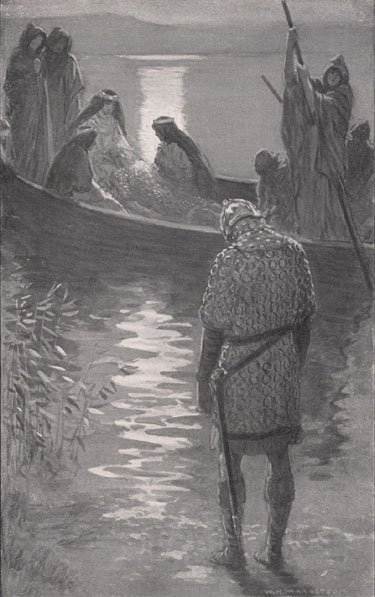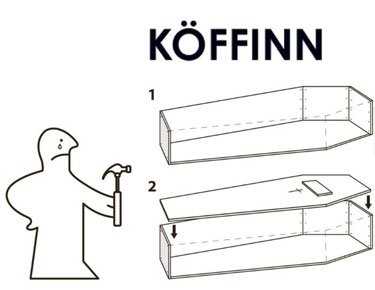Archive for January, 2018
31 Jan 2018

Then loudly cried the bold Sir Bedivere:
‘Ah! my Lord Arthur, whither shall I go?
Where shall I hide my forehead and my eyes?
For now I see the true old times are dead,
When every morning brought a noble chance,
And every chance brought out a noble knight.
Such times have been not since the light that led
The holy Elders with the gift of myrrh.
But now the whole Round Table is dissolved
Which was an image of the mighty world,
And I, the last, go forth companionless,
And the days darken round me, and the years,
Among new men, strange faces, other minds.’
And slowly answered Arthur from the barge:
‘The old order changeth, yielding place to new,
And God fulfils himself in many ways,
Lest one good custom should corrupt the world.
Comfort thyself: what comfort is in me?
–Alfred Lord Tennyson, Idylls of the King.
In Memoriam RMB.
30 Jan 2018


Christopher Michael Langin explains why conventional American education short changes the genuinely smart.
Owing to the shape of a bell curve, the education system is geared to the mean. Unfortunately, that kind of education is virtually calculated to bore and alienate gifted minds. But instead of making exceptions where it would do the most good, the educational bureaucracy often prefers not to be bothered.
In my case, for example, much of the schooling to which I was subjected was probably worse than nothing. It consisted not of real education, but of repetition and oppressive socialization (entirely superfluous given the dose of oppression I was getting away from school). Had I been left alone, preferably with access to a good library and a minimal amount of high-quality instruction, I would at least have been free to learn without useless distractions and gratuitous indoctrination. But alas, no such luck.
While my own background is rather exceptional, it is far from unique. Many young people are affected by one or more of the same general problems experienced by my brothers and me. A rising number of families have severe financial problems, forcing educational concerns to take a back seat to food, shelter, and clothing on the list of priorities. Even in well-off families, children can be starved of parental guidance due to stress, distraction, or irresponsibility. If a mind is truly a terrible thing to waste, then the waste is proportional to mental potential; one might therefore expect that the education system would be quick to help extremely bright youngsters who have it rough at home. But if so, one would be wrong a good part of the time.
Let’s try to break the problem down a bit. The education system is subject to a psychometric paradox: on one hand, it relies by necessity on the standardized testing of intellectual achievement and potential, including general intelligence or IQ, while on the other hand, it is committed to a warm and fuzzy but scientifically counterfactual form of egalitarianism which attributes all intellectual differences to environmental factors rather than biology, implying that the so-called “gifted†are just pampered brats who, unless their parents can afford private schooling, should atone for their undeserved good fortune by staying behind and enriching the classroom environments of less privileged students.
HT: Vox Day.
29 Jan 2018


Kassnar Imports Feg Pjk-9hp 9mm pistol
Gay Writer Justin Quarry struggles to understand the meaning of 9mm Browning High Power clone left to him by his proletarian hunter father. An interesting variant on the deracinated-member-of-the-urban-community-of-fashion-meets-firearm genre.
When my father died in the winter of 2000, back when I was newly 19, the single thing he left me was a nine-millimeter pistol. The day after his funeral, my grandfather simply told me my father wanted me to have it, handing it to me in its ragged original packaging — spare bullets, along with the pistol, spilling from the Styrofoam encasement as I opened the discolored box.
This inheritance both surprised and confused me. For one thing, though I’d spent my early childhood with rifles and shotguns racked against the walls of our home and the rear window of my father’s Jeep, with countless taxidermied deer heads gazing down at me apathetically, I’d never known my father to own a handgun. For another, unlike all the other men in my family, I’d never spent a second in a tree stand, didn’t even recall playing with toy guns; rather than pretending to shoot deer or Iraqi soldiers, for instance, one Christmas I requested and received a custom-made deer costume for my Cabbage Patch doll, Casey.
The pistol also puzzled me because I hadn’t necessarily expected to inherit anything at all from my father. …
The pistol haunted me, even as it burrowed in my boyhood bedroom closet where I left it after my grandfather gave it to me, with my comic books and Magic: the Gathering cards, hundreds of miles away in the Mississippi Delta. It became an almost magical object to me because of its peculiarity in the context of my life, because of its singularity in what my father had bequeathed me. I struggled to decipher this talisman, the idea of it, as I simultaneously struggled to decipher myself.
The day after my father’s funeral, my grandfather simply told me my father wanted me to have his gun, handing it to me in its ragged original packaging.
In college, apart from my family, I discovered I had little identity without them, so entangled had I been throughout my childhood in my parents’ battles and crises. Even more, I was the first person in my family to go to college and one of very few of us to leave the flatlands of Arkansas. Once I went to Vanderbilt I was an alien, or a more apparent one, whenever I came home. However, being one of very few first-generation college students on campus, I was even more an alien at Vanderbilt. It was only when I began writing that I discovered how to create meaning for myself. …
The great thing about having a dead parent, I’ve heard, is that when you come out of the closet, you have one less person to disappoint. For me coming out didn’t just entail my sexuality but, moreover, my creativity as I declared myself a writer — the pressure all the higher as a first-generation college student, if only in my mind, to take a safer, more practical route However, as I sat so close to my father that day, with my hair dyed red and a Sarah McLachlan pendant on a choker around my neck, I imagined he might have seen — even before I did, even before I had an inkling I was an artist — that I’m gay.
Still, I wonder what story he might have imagined about me that would lead him to leave me the pistol.
I wonder, what else might he have seen about me that day, that at age 19 I wasn’t able, that even now I may not be able, to see about myself?
***
A decade later, I returned to Nashville to teach at my alma mater, and though I’d had luck in publishing shorter work, in reinventing myself through writing, I continued to toil over a novel-length manuscript I’d been trying to wrangle for years. Then one May I retreated to rural Minnesota where I could write in solitude for entire days and, in theory, with such intense focus, make major headway in crafting my book. However, that month, as I more and more slowly plodded on the page, I looked out the windows of my studio to the cold, gray spring, and even more slowly plodded until I at last gave in to the confusion of that world I struggled to order. Until I at last crumpled under its weight.
I felt not only that I had failed at writing but also that writing had failed me. I saw how isolated I was — not just in Minnesota but also in my life. I lived alone and devoted almost every available hour to writing, often rejecting invitations for the possibility that I might write at the given time, or the risk that going out might leave me unable to write the next morning. …
Two weeks later after I returned from my writing retreat, I visited my mother, with whom I’d skipped Mother’s Day to be in Minnesota. But I hadn’t only gone to Arkansas to see her and to make up for the missed holiday. I’d also gone to retrieve my father’s pistol. My pistol.
Before, every time I pondered finally taking the pistol into my possession, simply as a novelty, yet another mass shooting would occur somewhere in America, sparking yet another debate over the Second Amendment, making merely owning a gun feel like a political act, and in turn repelling me from it. But now I’d decided to use the gun as a means of taking myself as far outside my current experience, as far from my writing, as I could. I’d decided to get professionally trained on it. I wanted to try on the identity my father had perhaps imagined for me in his giving me the gun, and maybe even in his fathering me.
RTWT
——————————————-
Roughly 60 years ago, the humorist Corey Ford used to publish a monthly feature in Field & Stream magazine called The Lower Forty, a chronicle of the adventures of a fictional informal club of small-town New England sportsmen formally titled “The Lower Forty Hunting, Shooting and Inside Straight Club.†The club’s leader and role model was Judge Parker (a fictional version of a friend of Ford’s named Parker Merrow).
Around 1960 or 1961, Parker Merrow received by telegram the news that his son, at the time serving as an Air Force officer in Japan, had fathered a baby boy. Judge Parker sat right down and wrote a “Letter to a Grandson,†which he shared with Corey Ford, who quoted it in full in one of the most moving and memorable of the Lower Forty stories.
“Letter to a Grandson” does a pretty good job of explaining to Justin Quarry what his Maytag-repairman father was trying to leave him.
TO MY GRANDSON:
This letter will be yours on your 16th birthday. If I am alive then, I will read it to you. If I have checked out before that date, please go off by yourself, alone, and read it aloud.
Three hours ago your father cabled me that you were in this world, that you and your mother were doing well, and that you will bear my father’s name.
So for three hours I have been celebrating your birth in an orderly and thorough manner. I have given your grandmother a couple of tranquilizer pills to calm her hysterics at the good news. I have notified all your father’s friends in town as he requested, so they can celebrate also. I have stopped at the bank and arranged a modest trust fund which should see you through college. I have had several drinks, and now I am writing a letter to you to open 16 years later.
I will waste neither your time nor mine in giving you advice. If by the time you are of age you do not know the meaning and practice of truth and loyalty and courage and honesty, and the deep satisfaction of doing hard work both physical and mental, then your great-grandfather did a hell of a poor job raising me, and I did a hell of a poor job raising your father.
I am leaving you a few things.
First I leave you your great-grandfather’s weapons. He taught me how to shoot a pistol with his .38 Colt Army. I have not fired it since the day he died. I will give it a real good cleaning, and put the neat’s-foot oil to the holster, and leave it with the same loads that he put in the cylinder himself the last time he dropped the hammer. Also you will receive his .30/30 carbine and his 12-gauge Greener. No buck ever went very far that caught one of my dad’s .30/30s behind the foreshoulder. No goose kept flying very long that he centered with a load of 4s..
Next I leave you my old Browning five-shot 12-bore. I have used that gun so much it has been reblued and rebuilt twice. Also my scope-sighted Model 70 Winchester .30/06. Also my house gun, a .357 Magnum Smith & Wesson snub nose. A man who is not ready and able to defend his home does not belong in our family.
Also I leave you my 81/2-foot, 4-ounce Leonard rod, which is as good as the day it was built, and they do not build them any more. I leave you my 9-foot, 61/2-ounce Orvis light salmon rod, which has killed some good fish in Canada and Alaska and Ireland. You may fish some of the same pools with it. I leave you my favorite 8-foot, 31/2-ounce fly rod which Walt Powell made for me, and which can lay a No. 12 Spentwing Coachman on the water slicker than a schoolmarm’s leg. All these rods and guns will be cleaned and cased and tagged with your name for presentation with this letter.
More important, I am leaving you some memories. I hope that through the years they will be your memories, as they have been mine, as they are now your father’s, as they were your great-grandfather’s once.
I leave you the cold gray dawn and the marshes and the wind and the slap of wavelets and whistle of wings and the recoil of your gun against your shoulder.
The creak of packstraps in the dark and the thud of moccasins on the steep trail and the deep breathing as you and your hunting partner pack out your deer.
The easy grating of your canoe over a gravel bar and the shaking out of your line in the last long dusk and the sudden staccato scream of your reel.
The flutter and thump of a turkey gobbler coming down from his roost in that first light when you can count the eyelets of your boots.
The taste of a cold mountain spring as you lie on your belly with your mouth spitting cotton.
The smells that men like to remember-pipe smoke and boot dubbing and Hoppe’s No. 9, and fly dope on a red bandanna handkerchief, and the smell of leather that is more like a taste, and the before-breakfast smell of coffee and bacon frying, and the smell of a cottonmouth, the smell of fear, and the fall smells of sweet-fern and rotting apples and burnt powder in the frosty air.
I leave you a windy spring night and the shrill of peepers like sleigh bells and the far-off baying of geese heading north in the empty sky.
Swimming stripped in a clear lake under an August moon and then standing on the shore with a cigarette while the night wind dries your body and the loons call.
An afternoon in October and a bird-dog puppy staunch on his first point with one foreleg drawn up and his brown eyes fixed and his whole skinny body shivering with the strange new excitement of grouse.
A winter evening with the sleet against the window and a log blazing and a highball and some friends you have hunted and fished with to share your memories with you.
All these and more I leave to you, my beloved grandson. Perhaps I will live long enough to be at your side when they become your memories too. But if I do not, I raise my glass to you across the years.
29 Jan 2018

—————————————

John Terrell: “Good luck putting his casket together.”
BBC story
29 Jan 2018


Teresa Mull, like me, is a native of Pennsylvania Coal Country.
This winter, I went back to the woods. The backwoods.
My homeland is Central Pennsylvania, and I returned there to celebrate Christmas with the family and to help out with the coal furnace during the bleakest time of year (more on that later). Hunter S. Thompson spent a stint of his youth in my native neck of the woods, “in an abandoned coal town†as he put it, and deemed it “barren…[where nobody else] was between the ages of fifteen and fifty.†He wrote to a friend of the region’s “mountains of coal dust, dirty old people, ancient wrecks of houses†and said the experience was like “having a nightmare.â€
James Carville famously labeled the stretch of land between Philadelphia and Pittsburgh as “…Alabama without the blacks. They didn’t film The Deer Hunter there for nothing,†while also noting “The state has the second-highest concentration of NRA members, behind Texas.†Others refer to it, both affectionately and derogatorily, as “Pennsyltucky.â€
Thompson’s rural Pennsylvania gig was early on in his career, before, I think, his literary licensing and drug use were firing in full force, and I can attest that his descriptions are, even now, spot-on. As far as Carville’s assessment goes, despite being a Democrat, he’s not too far off either. Hunter safety class was a required part of my Catholic school’s curriculum in the second grade. SECOND GRADE. And the first two days of deer season were always school holidays.
Central PA is indeed a forgotten part of the country, with tired, old mountains, dreary weather, a generally pessimistic populace, an overgrown, unkempt natural beauty, and archaic everything. But it’s not completely charmless. It is home, after all.
Returning to Pennsyltucky during the winter months means enduring the Eternal Grey—days you’re not sure are really days exactly; more like sepia extensions of early dusk. One great cloud amasses its forces in early November and lingers over the sun until at least Easter, at which point it habitually snows.
The snow does make the Appalachian dilapidation very pretty, covering rusty, run-down, soggy, boggy, moldy things with a pure, clean blanket of white stuff. It doesn’t last though. Like a Catholic fresh from the confessional, a day or two’s time is enough to gather a layer of grime. Growing up, “don’t eat the snow†was a rule not because animals made it yellow (though they did), but because chimneys pouring out rich, black smoke left a layer of soot on top (and still do).
Hunting is a popular pastime here and camouflage is acceptable year-round and in all circumstances. Camo is seen at the gym (I know one regular who sports camo knee sleeves), at proms and weddings, on cars and in them. Camo, like guns, goes with everything. A billboard greets me on my way into town advertising camo coffee cups (if that isn’t dedication, I don’t know what is). It’s a wonder more people don’t accidentally collide with each other!
Going to the gun store is another popular regional pastime, even when hunting season is still months away. Here you can meet the “bitter†people Barack Obama referenced in 2008 who “cling to guns or religion.†The last time I was at my neighborhood guns and ammo shop, I overheard a gruff customer justify his purchase of another firearm to his wife by saying, “Trump’s not gonna be in office forever,†and then, apropos of nothing, “LIBERAL A**HOLES!â€
RTWT
She’s right that the small cities and towns that used to be flourishing are all hollowed out today, their Main Streets abandoned, and the post-WWII brain drain to the cities is still continuing, but Central Pennsylvania is actually a nice place to retire.
The people are friendly. Taxes are low. The scenery is only slightly inferior to Vermont’s. We have the best trout steams in the East. The pheasants have gone extinct, but we have good grouse shooting, and plenty of deer and turkey. If you win the ticket lottery, you can even shoot an elk. And everywhere you look there are Trump signs.
28 Jan 2018


The Onion:
LOS ANGELES—Shedding new light on the tragic ending to his critically acclaimed portrait of the animal activist, filmmaker Werner Herzog told reporters Wednesday that he killed and ate Timothy Treadwell in 2003. “I should finally say that during the filming of my documentary Grizzly Man, I mauled Timothy Treadwell to death and then devoured his remains,†said Herzog, admitting after 15 years that it was in fact he and not the grizzly bears of Katmai National Park who sunk his teeth into Treadwell’s neck, ripped out his jugular, and feasted on his organs. “Timothy and his girlfriend Amie Huguenard were setting up camp by a salmon stream when I approached them, aggressively batted them around, and then tore them limb-from-limb while they screamed. His judgment was perhaps clouded by his optimistic view of nature, which, in the end, sadly led to me picking his bones clean.†Herzog went on to say that the most tragic part of the story was that, after years of integration, Treadwell felt he had finally gained his trust.
28 Jan 2018


Patricia McCarthy reflects on the ironies of Class in America in a time when the elites are deluded and corrupt and the Common Man is proving himself superior.
Somewhere over the last few days a wise person wrote that “if only the rich and powerful could grasp the notion that the rest of the citizenry does not envy them,” does not wish to live in their mansions, to drive their cars, or to send their children to the prestigious private schools to which they send their children. If our wealthy elites could get over their superiority complex and accept that most of us do not envy them, they might be better citizens, more respectful of the rest of us, better leaders. Illustrious schools may give those children of the rich and powerful a leg up but they do not guarantee happiness, kindness to others, or generosity of spirit. Their inherited wealth does not guarantee they will be good spouses or parents. It is more likely that the children of the very rich often lack the character of their ancestors who actually worked very hard to make the money on which they live so well today.
Those children of the very wealthy who are sent off to expensive boarding schools, to the Ivy Leagues, do not necessarily lead happy lives. Much is expected of such inheritors of wealth and privilege; they must be as successful as their elders, productive in the name of the family. They must belong to the right clubs, dine at the right restaurants, shop at the right couture shops, hire the right caterers, see the right plays, etc. … Their kids must be accepted to the right pre-school, let alone the right private elementary and high school. Their kids are pawns in an ugly, cutthroat game of parental bragging rights. …
The comical aspect of our current political spectrum is that the not-rich progressive leftists are extremely envious of the very rich. They are angry that they exist. They resent their good fortune. These were the Bernie Sanders supporters; Bernie did a good job of filling them with rage against the undeserving rich, socialist that he is. Obama’s and Hillary’s supporters were the virtue-signaling left, often rich themselves but generally ignorant of history and the actual policies of the right, the ones that aim to engender self-reliance and smaller government, the policies that would truly empower minorities rather than make them dependent. Those folks are all about big government, entitlements, mandates, and control of the masses that they disdain.
Most Americans could not care less about the shallow pursuits of the one percent. They want to live their lives, raise their kids to be good citizens, enjoy their sports, their faiths, their hobbies, and varied pursuits and to be left alone by the government. They do not want the state or federal government to mandate that their kids need to know about homosexuality and transgenderism in kindergarten or that males can use the girls’ bathroom if he/she feels like it. This is not the stuff of the American heartland which is why those Americans are so hated by the elite denizens of the beltway and the left coast. Those oh-so-elegant folks wallow in their misery at having to abide “normals.” But it is the normals who corner the market on common sense, real diversity and actual grace. There is nothing of grace among the anti-Constitution leftists.
These people, our supposed betters who wield power and are able to influence how the rest of us live, very truly believe they are superior beings. Only they have the correct opinions. Only they go the right schools, read the correct publications and websites. One only has to read James Damore’s complaint against Google to see how narcissistically arrogant the tech left has become. Read Melinda Byerley’s tweets that express her contempt for Americans unlike herself. Listen to Hillary’s speech about Trump supporters as deplorables. That is what they believe.
The left these days is vicious and intolerant. Leftists no longer even pretend to condone diverse or opposing opinions. They are demonstrating bad behavior all over the nation with their silly marches. Conservatives were horrified at what Obama did to this country over his eight years but we did not act out like banshees in the streets. Our left has surpassed Saul Alinsky’s tactics in their campaign to destroy those whom they oppose. That would be anyone with a differing thought. Consider the campaigns to prevent conservative speakers from appearing at any university and the offer of counseling if one is allowed to speak.
The American left today is fascist. They intend to dictate to every citizen what they can say, do or think. And they are indoctrinating our young people, our elementary through university students, with their radical intolerance. College students no longer learn about the horrors of communism and fascism, both products of the far left. No, they are being trained to be mind-numbed, doctrinaire leftists. They learn to renounce their country, our Constitution, to abhor themselves if white, to see themselves as a victim and so superior if black, Hispanic, etc. To be a minority in America is to be privileged in one sense. Unless one is Asian! Asians are not victims because they value education and succeed in record numbers. They are discriminated against for being successful.
Victimhood is a status symbol on American campuses. Gov. Andrew Cuomo of NY wants to give all illegals free college tuition! While native-born students are condemned to usurious student loans or no college? Why is the entire country not sick to death of the left’s prioritizing illegal immigrants over our citizens? It is so obviously all about votes. If these immigrants were going to be voting Republican, the border would have been sealed up long ago. Make no mistake, this is all about importing Democrat voters. The less educated, the more dependent on U.S. government, the better. They will vote democrat.
RTWT
27 Jan 2018


Current Head of Silliman College: Laurie Santos, Harvard ’97 A.B psychology & biology, ’03 Ph.D. psychology.
The new all-time record enrollment Yale course is a 1200-student T-group taught by Yale’s own equivalent of Oprah, the new “Head” of Silliman College, appointed right after all the Snowflakes-of-Color chased Nicholas Christakis and his wife Erika off-campus and right out of town for the hideous thought-crime of defending free Halloween costume expression (!).
NYT:
On Jan. 12, a few days after registration opened at Yale for Psyc 157, “Psychology and the Good Life,†roughly 300 people had signed up. Within three days, the figure had more than doubled. After three more days, about 1,200 students, or nearly one-fourth of Yale undergraduates, were enrolled.
The course, taught by Prof. Laurie Santos, 42, a psychology professor and the head of one of Yale’s residential colleges, tries to teach students how to lead a happier, more satisfying life in twice-weekly lectures.
“Students want to change, to be happier themselves, and to change the culture here on campus,†Dr. Santos said in an interview.
“With one in four students at Yale taking it, if we see good habits, things like students showing more gratitude, procrastinating less, increasing social connections, we’re actually seeding change in the school’s culture.â€
Dr. Santos speculated that Yale students are interested in the class because, in high school, they had to deprioritize their happiness to gain admission to the school, adopting harmful life habits that have led to what she called “the mental health crises we’re seeing at places like Yale.†A 2013 report by the Yale College Council found that more than half of undergraduates sought mental health care from the university during their time at the school. …
Students have long requested that Yale offer a course on positive psychology, according to Prof. Woo-Kyoung Ahn, director of undergraduate studies in psychology, who said she was “blown away†by Dr. Santos’s proposal for the class.
Administrators like Dr. Ahn expected significant enrollment for the class, but none anticipated it to be quite so large. “Psychology and the Good Life,†with 1,182 undergraduates currently enrolled, stands as the most popular course in Yale’s 316-year history. The previous record-holder — “Psychology and the Lawâ€â€” was offered in 1992 and had about 1,050 students, according to Prof. Marvin Chun, the Yale College dean. Most large lectures at Yale don’t exceed 600.
Offering such a large class has come with challenges, from assembling lecture halls to hiring the 24 teaching fellows required. Because the psychology department lacked the resources to staff it fully, the fellows had to be drawn from places like Yale’s School of Public Health and law school. And with so many undergraduates enrolled in a single lecture, Yale’s hundreds of other classes — particularly those that conflict with Dr. Santos’s — may have seen decreased enrollment.
At the start of the semester the class was divided between a live lecture in 844-seat Battell Chapel, a historic place of worship on campus, converted to a lecture hall, and one or two smaller auditoriums where several hundred more students watched a live stream of Dr. Santos. After several weeks, the decision was made to move the lectures to Woolsey Hall, usually the site of events like symphony performances, which can accommodate the entire class.
RTWT and weep.
In the old days, the huge draw classes were things like Vince Scully’s History of Architecture and the draw factor was simply the sheer brilliance and encyclopedic knowledge of the lecturer. Rather than lining up in droves for tea and sympathy and advice on finding happiness, the Yalies of my day would have laughed Laurie Santos right off the stage.
27 Jan 2018

250 million year old salt expires next year.
26 Jan 2018

We live in an appalling age. When the White House requested a (conventionally granted) loan of a painting by Van Gogh from New York’s Guggenheim Museum, the kind of request that constitutes an honor and an opportunity for institutional service to the nation, the museum’s chief curator proved incapable of rising above the most vicious kind of political partisanship and responded with a crude gesture of vulgarity designed to express the highest degree of contempt while supposedly flourishing that establishmentarian curator’s skill at drawing upon the canon of the Arts.
The Washington Post gloatingly reported:
The emailed response from the Guggenheim’s chief curator to the White House was polite but firm: The museum could not accommodate a request to borrow a painting by Vincent van Gogh for President and Melania Trump’s private living quarters.
Instead, wrote the curator, Nancy Spector, another piece was available, one that was nothing like “Landscape With Snow,†the 1888 van Gogh rendering of a man in a black hat walking along a path in Arles, France, with his dog.
The curator’s alternative: an 18-karat, fully functioning, solid gold toilet — an interactive work titled “America†that critics have described as pointed satire aimed at the excess of wealth in this country.
For a year, the Guggenheim had exhibited “America†— the creation of contemporary artist Maurizio Cattelan — in a public restroom on the museum’s fifth floor for visitors to use.
But the exhibit was over and the toilet was available “should the President and First Lady have any interest in installing it in the White House,†Spector wrote in an email obtained by The Washington Post.
The artist “would like to offer it to the White House for a long-term loan,†wrote Spector, who has been critical of Trump. “It is, of course, extremely valuable and somewhat fragile, but we would provide all the instructions for its installation and care.â€
RTWT

Vincent van Gogh, Landscape with Snow, 1888, Guggenheim Museum.
Proving that the big brains at the Guggenheim, who so look down on Trump, are actually the kind of idiots willing to accept a gold-plated toilet, created as a slur on the same free enterprise system that funded the Guggenheim’s creation, as “art” worthy of presentation by a major museum. I’ve seen Donald Trump’s interior design choices, and I could picture Donald Trump having gold-plated thunderboxes in his penthouse, but he’d be sensible enough to use them practically. Trump wouldn’t take a gold-plated crapper as some kind of artistic statement unlike the dodos sitting atop our arts establishment.
Can anyone picture the head of a prominent museum, just a few decades ago, indulging in such a spiteful, vulgar, and scatological expression of partisanship? People simply did not behave like that. They had enough good sense to recognize that no political party possessed a monopoly of good intentions or virtue and that one’s preferred side inevitably sometimes lost. If someone in a responsible position did not happen to like the current occupant of the White House, he simply did his job and kept his feelings and political opinions to himself. Today’s establishment is made up of self-righteous simpletons, eaten up with self-entitlement, lacking common sense, decency, and good manners.
/div>

Feeds
|
















